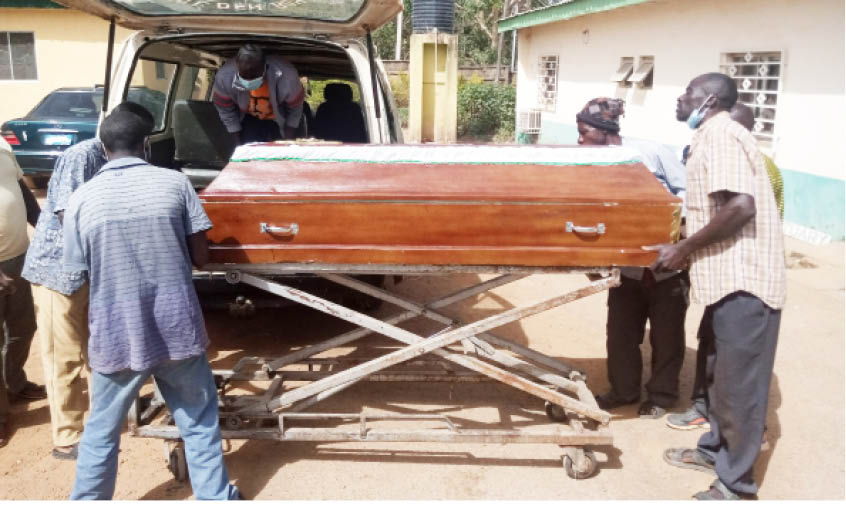Musa Mangai was a Ganawuri boy who wanted to become a herdsman and for 16 years, he lived with them and became one of them. A fortnight ago, Musa and another herdsman, Ibrahim Saidu, were murdered in cold blood by a Police Divisional Officer in Bassa LGA of Plateau State. Daily Trust reports on the short lives of the herdsmen, how a Ganawuri boy became one with the Fulani and the controversy trailing their extra-judicial killings.
When Musa Mangai was a young boy growing up in Bassa Local Government of Plateau State, he would see the herdsmen guiding their cattle home at sunset and dream of becoming one of them. The problem was that he was not Fulani but a Christian Ganawuri boy.
When his father, Giwa Mangai, saw how much that dream meant for his son, he led him by the arm and handed him over to a tribe of Fulani herdsmen to train him in their ways.
For 16 years, the young boy grew up as a herdsman, lived amongst them, ate with them and, as photos, suggested, came to look like one of them.
“Musa lived a very good life with the Fulani he was staying with. I have never for once had a problem with them,” his father said.

Mr Mangai missed his son. He had his own dreams for him and even attempted to get his son back.
“I remember sometime in the past when I decided to bring him back home but he told me that he was comfortable staying with the Fulani and so, I allowed him,” he said.
For those 16 years, Musa lived his dream until at 27, his dream came to a violent and abrupt end when a police officer executed Musa and another herdsman, Ibrahim Sa’idu, 30 in cold blood and very controversial circumstances.
What led to the tragic killing began with the loss of a cow.
Every evening when the herdsmen of Kesuma, or Bayan Dutse, in Bassa return, it was customary to take a headcount of the cattle.
“On Saturday, unfortunately, when the cattle returned home, we realized that one was missing,” Adamu Muhammad, the Fulani leader of the area said. “Immediately, I called the community leader of Dogondaji to inform him that one of our cows was missing and some of our youth would go round to search for it.”
Muhammad said he gave the prior notice to the community leader to avoid raising any suspicion by the unusual night movement of the herdsmen.
At 6 pm, 18 herdsmen spread out to look for the cow. They found the cow but lost two herdsmen.
By 8: 30 pm when Musa Giwa and Ibrahim Sa’idu had still not returned, worried, their kinsmen and neighbours tried to reach them on the phone.
Even though their phones were not connecting, no one at first thought that it could be something serious—something as grave as a matter of life and death.
But as the night wore on, anxiety grew.
“We were all disturbed by the situation,” Muhammed said. “I called the community leader for the second time to ask if his community was aware of their whereabouts and he told me that two Fulani herders were arrested by their vigilantes and had been handed to the police in Bassa and we should not worry that their safety was assured.”
This news gave them some assurance since the herders were in the custody of the police. They believed whatever accusation was levelled against them could be cleared.
The following day, relatives went to Bassa to retrieve their kin. At the Bassa Police Headquarters, whatever assumptions they had about the wellbeing of the two men quickly dissipated.
“On getting to the Police Headquarters in Bassa, we were surprised to be told that Musa and Ibrahim were found dead by the vigilantes and the police were only asked to evacuate their bodies from somewhere,” Muhammed said.
This new version of the account added to the relatives’ shock of finding the two missing herders dead.
Daily Trust had reported previously that both the vigilantes and the police disagreed over who was responsible for their deaths, with the vigilantes insisting that the two men were well and alive when they were handed over to the police.
The spokesperson of the state police command, Ubah Gabriel, said all the officers involved in the incident have been detained and an investigation was ongoing.
“The Command is aware of the death of two herders in Bassa. The circumstances in which they met their untimely deaths are yet unclear. Every personnel involved is under detention. There are also allegations that the deceased are some of the hoodlums disturbing the area. Meanwhile, a discrete investigation is ongoing,” he said.
However, the Miyetti Allah Cattle Breeders Association of Nigeria (MACBAN) through its state chairman, Malam Nura Abdullahi, told Daily Trust that the herders were unarmed when they were taken by the vigilante, saying there was no evidence suggesting that they were criminals.
“They were not seen with a gun or any dangerous weapons. They went out to search for a missing cow and we had given prior notice before they did so. It is even unfair to describe them as hoodlums,” Abdullahi said.
He insisted that after the vigilantes handed the two men over to the police, they were not even taken to the station for questioning.
“They were deliberately executed by the District Police Officer (DPO) of the area, DSP Solomon Machu, an hour after they were given to him. During cross-examination, he confirmed that he had killed the herders on the grounds that they were armed robbers and that wasn’t true,” Malam Abdullahi said.
Daily Trust investigation revealed that the DPO at the centre of the controversy as of last week had been removed and a new one had been deployed to the area.
While accusations and counter-accusations are being traded, on Thursday, Giwa Mangai and Sa’idu Adamu went to the mortuary of the Plateau Specialist Hospital to collect the remains of their children for burial.
They described the action of the DPO as barbaric. They insisted their children were innocent as they were not found with any weapon or any incriminating evidence to suggest they were criminals.
They want the authorities to ensure that justice is done to the victims.
Giwa Mangai, father to the late Musa said, “I was shocked when I was called for the first time that my son was shot by the police for no reason. At first, I didn’t believe it until I saw the bodies myself. I want the police authority to ensure that the culprit is dealt with according to the law of the land.”
While expressing his sadness, the father of Ibrahim, Adamu Idris said, “The action of DSP Machu has indicated that there was no law in the land. If government officials, like a police DPO, would commit this kind of brutality, it means that we were not all safe. I am calling on the government to ensure justice in the killing of our children.”
The killing has generated angry reactions and had been subjected to various interpretations.
“If what I had heard was what happened, it is an extrajudicial killing because no investigation was carried out before the shooting of the herders,” Barrister Lawan Ishak, a Jos-based lawyer said. “There was neither any attempt of escaping nor holding a weapon during the arrest.
“The vigilante arrested them and handed them to the police to investigate, before the following morning, the herders were killed. Supposing, they were suspected to be criminals or arrested with a gun, they have to be investigated and taken to court for prosecution, found guilty before any action is taken upon them.”
The lawyer said it was a culpable homicide punishable with death under section 221 of the penal court law.
While MACBAN praised the prompt action of the police to remove the DPO and replace him with a new one, both the leadership of the group and the parents are waiting to see when DSP Solomon Machu would face his prosecution.
“Today, Musa has gone for good. I came to carry his remains for burial,” Giwa Mangai said. “The person who committed this act knows that what he did was not good.”
While the grieving parents bury their slain children, the question remains: when will their murderer answer for his crime?




